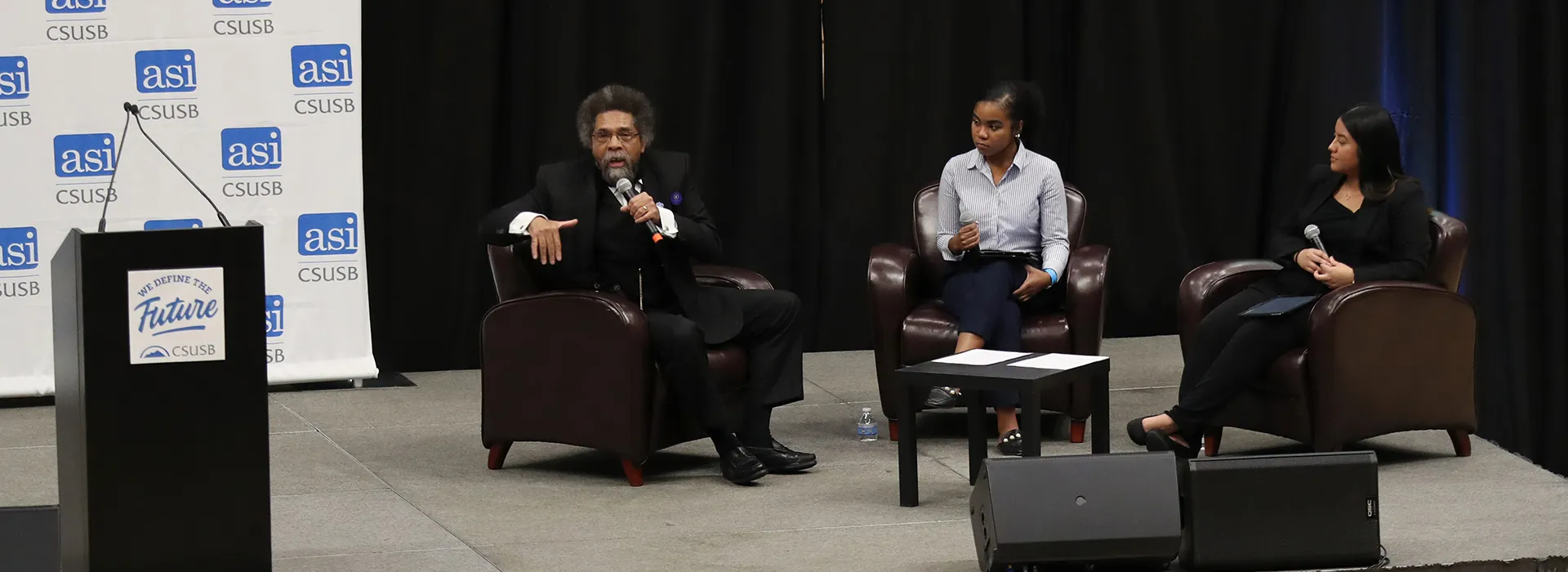Joe Gutierrez Office of Strategic Communication (909) 537-5007 joeg@csusb.edu

Prominent social critic, author, academic and political activist Cornel West believes American society today doesn’t challenge itself and would rather just fit in.
“We live in a culture where everybody wants to be so successful, obsessed with spectacle and image that we’re willing to conform to what’s in place, and you end up well adjusted to injustice,” West said. “You just want to fit in. You don’t want to take a risk and try to be decent, and have integrity. You just want to be well adapted to the indifference.”
West made his comments to an audience of more than 1,200 people who came to Cal State San Bernardino’s Coussoulis Arena on Jan. 25 for “An Evening with Dr. Cornel West.”
The event, sponsored by the university’s Associated Students Inc., featured insights from West on topics that included racism, education, advocacy, social justice and American society.
“Part of our problem these days is so much of American culture is a superficial culture of image. What things appear to be, what they look like, everybody seems to be obsessed with what people are saying about them, how others perceive them,” West told the audience. “It’s all a matter of what’s on the surface rather than what is substantive.”
In a talk that was at times uplifting, challenging, demanding of social justice and honesty, West spoke of the need for all to speak out and work together.
“I’m saying that we’ll never be able to transmit and bequeath the best of the past to the younger generation unless we follow the anthem of Black people, which is to lift every voice,” West said. “It doesn’t say lift every echo.”
West, who is a professor of the Practice of Public Philosophy at Harvard University, talked about how his life was shaped by his parents and growing up in Sacramento.
“I want to be very honest and frank with you. I am who I am because somebody loved me.
Somebody cared for me. Somebody targeted me,” West said. “The greatest honor I will ever have in all of my life is being the second son of Clifton West and Irene West.”
West praised his father who “set such high standards of moral and spiritual excellence in my life,” and his mother, a dedicated teacher and educator for whom an elementary school was named: Irene B. West Elementary School in Sacramento.
“I wish you all could just meet her for at least a minute,” West said. “Then you all could understand how I’m a footnote that lovepush got me out. And I say that because it’s very important these days to situate and locate ourselves within greatness of various traditions and communities of those who loved us and shaped us because we live in such grim times.”
After his talk, West sat down to answer questions including what key steps young people could take to change the state of the current political environment.
West said the first thing young people have to do “is to love and respect yourself. To try to understand what your calling is in life and to never confuse your calling with your career. The fire inside of you can take a number of forms in terms of the kinds of jobs that you have, but if you’re true to your calling, you’ll be able to go from context to context and preserve your integrity and honesty and decency and courage.”
West, who is a professor emeritus at Princeton University, has taught at Union Theological Seminary, Yale, Harvard, and the University of Paris. West graduated magna cum laude from Harvard in three years and obtained his master’s and doctorate in philosophy at Princeton.
He is the author of 20 books and has edited 13. He is best known for his classics, “Race Matters” and “Democracy Matters,” and for his memoir, “Brother West: Living and Loving Out Loud.” His most recent book, “Black Prophetic Fire,” offers an unflinching look at 19th and 20th century African-American leaders and their visionary legacies.
He has appeared in over 25 documentaries and films including “Examined Life,” “Call + Response,” “Sidewalk” and “Stand.” He made his film debut in the “The Matrix Reloaded” and was the commentator (with Ken Wilbur) on the official trilogy released in 2004.
He has produced three spoken word albums including “Never Forget,” collaborating with the late Prince, Jill Scott, Andre 3000, Talib Kweli, KRS-One and the late Gerald Levert. His spoken word interludes are featured on productions by Terence Blanchard, The Cornel West Theory, Raheem DeVaughn and Bootsy Collins.
To learn more, visit his website, Dr. Cornel West.
For more information on Cal State San Bernardino, contact the university’s Office of Strategic Communication at (909) 537-5007 and visit inside.csusb.edu.